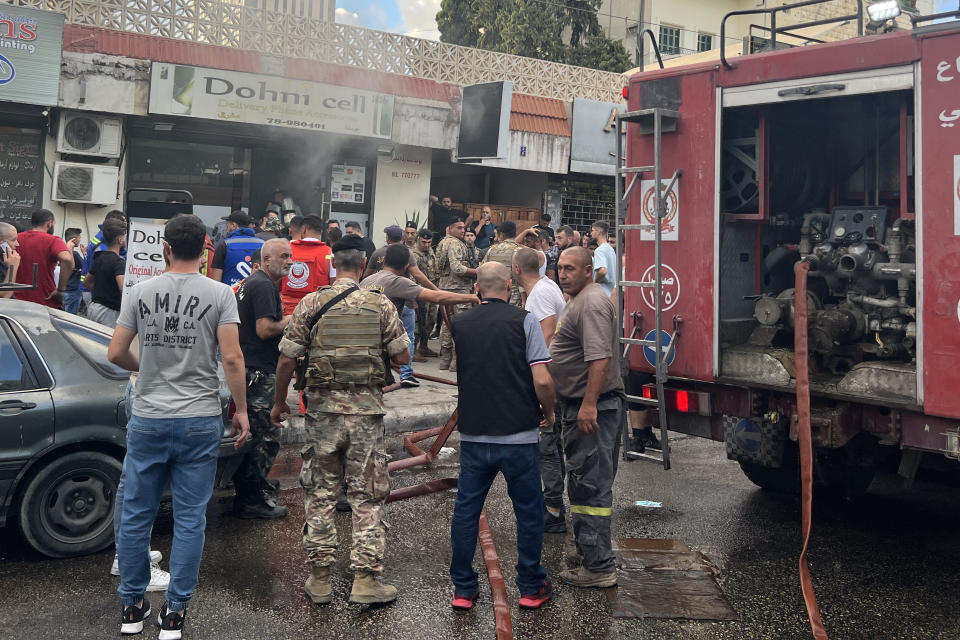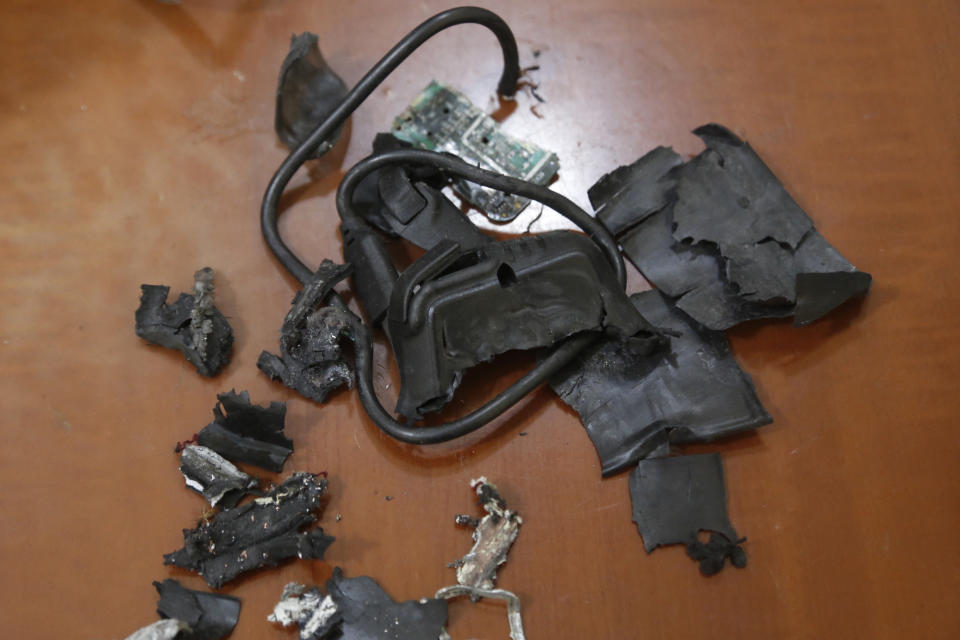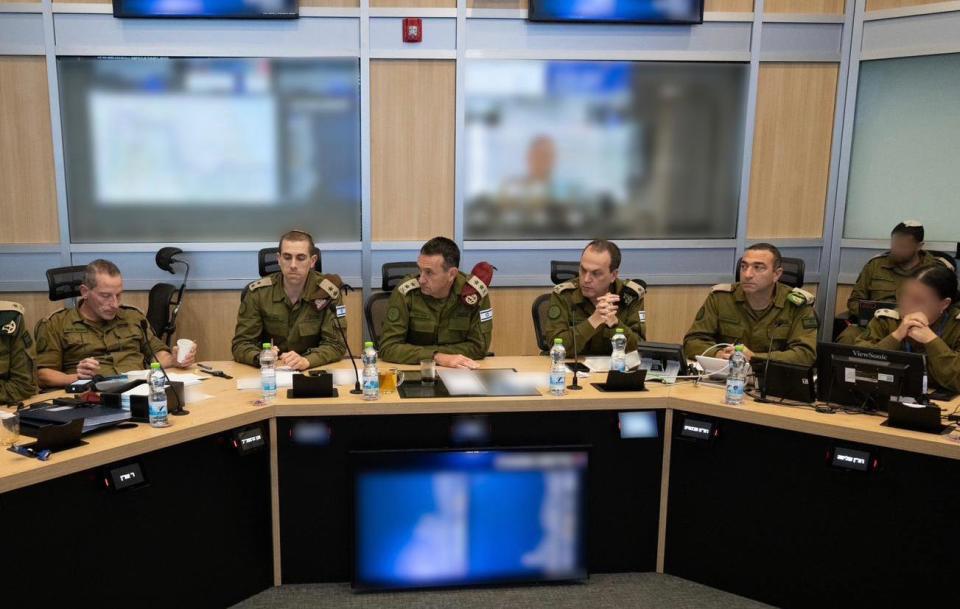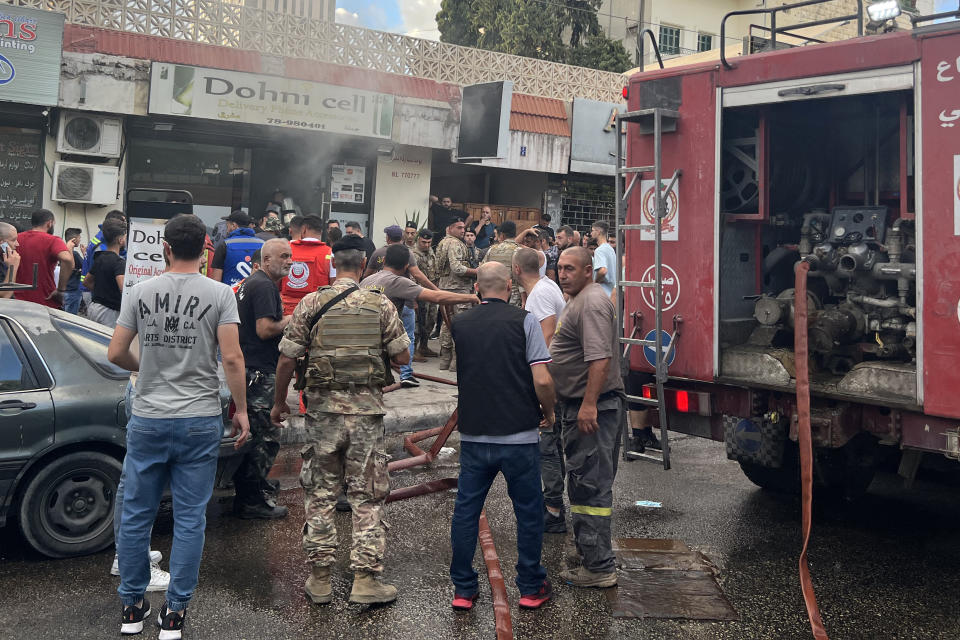Following yesterday’s unprecedented explosions targeting pagers belonging to thousands of Hezbollah members, which you can read about here, another wave of similar blasts has struck Lebanon. The second series of explosions seems to have targeted walkie-talkies used by members of the Iran-backed militant group, although there are suggestions that a variety of different electronic devices may have been affected. While Israel has not claimed responsibility for either of the two days’ attacks, Israeli Minister of Defense Yoav Gallant today declared the start of a “new phase” of the war with a focus on the northern front.
The latest reports from the Lebanese health ministry state that 14 were killed and more than 450 wounded in explosions that struck multiple cities across Lebanon today. Three of those killed were said to have been in the Bekaa region in the east of the country. Many of the injuries were reported to victims’ abdomens and hands, as was the case yesterday.

The Lebanese Red Cross said that more than 30 ambulances were deployed to “multiple explosions” in Lebanon’s south and east, with another 50 ambulances put on alert to support rescue and evacuation operations.
A Hezbollah source confirmed the nature of the attack, which so far bears many of the hallmarks of yesterday’s series of explosions, which was widely attributed to Israel.
As was the case yesterday, when pagers were targeted, injuring more than 2,800 and killing 12, the explosions today were reportedly “small in size.”

Photos and videos from today’s explosions showed various broken and burnt communication devices, among them multiple examples of the ICOM IC-V82 two-way walkie-talkie radio, a product made in Japan.
July 2022: United Against Nuclear Iran (UANI) identified a handheld VHF Transceiver Two-Way Radio manufactured by Japan’s Icom Inc. (Icom) being used by Hezbollah.
“In the photo a member of Hezbollah’s elite Radwan Unit is shown with an IC-V82/IC-U82” pic.twitter.com/eZFq9o3S96
— Daphne Tolis (@daphnetoli) September 18, 2024
One of the explosions took place during a funeral that was being held in southern Beirut for Hezbollah members killed yesterday.
Breaking: Thousands of Hezbollah radio devices (“Walkie-Talkie”) have exploded during the past hour, in what appears to be the second wave of the attack..
Below is a footage from today, exploding during the funeral of another Hezbollah terrorist who was killed yesterday
— Dr. Eli David (@DrEliDavid) September 18, 2024
In the wake of yesterday’s explosions, there were reports that Israel had managed to put small explosive devices in thousands of pagers that were bought by Hezbollah.
Today, several solar power systems reportedly also exploded in people’s homes across Lebanon, according to the National News Agency, with at least one such blast injuring a girl in the town of al-Zahrani, south Lebanon.
BREAKING:
All types of electric devices owned by Hezbollah operatives are now blowing up in Lebanon and the region.
Apart from pagers and walkie-talkies, other devices such as fingerprint devices, solar power systems and radios are now exploding too pic.twitter.com/JLjsK2w7co
— Visegrád 24 (@visegrad24) September 18, 2024
There have also been pictures of exploded fingerprint readers, like the one in the tweet above.
Additional reports state that at least one of the models of walkie-talkie that exploded in Lebanon today was discontinued, but that Hezbollah got a shipment of them five months ago, around the same time that it appears to have received the pagers involved in yesterday’s blasts. This would clearly point to the devices being tampered with before they arrived in Hezbollah’s hands.
However it was achieved, today’s events do at least suggest that many more types of electronic devices could have been modified into explosive devices, raising more questions about how the attacks were orchestrated, and whether more will come. The deeper implications of this dystopian development are something we have previously discussed at length.
UPDATE – The radios that were booby-trapped in advance by Israeli intelligence services and then delivered to Hezbollah were part of the group’s emergency communications system which was supposed to be used during a war with Israel, sources tell Axios https://t.co/9xXP55rhnv
— Faytuks News (@Faytuks) September 18, 2024
However, if Israel is now able to target Hezbollah members and associates via a variety of types of electronic devices, the last two days of attacks may also imply that Israel is poised to launch a large-scale campaign against the militant group.
Not only do these explosions help remove key Hezbollah figures from the equation, but they also greatly reduce the group’s ability to communicate and maintain a chain of command. Then there is the significant factor of sowing fear and confusion within Hezbollah but also more broadly within Lebanon, comprising the group’s ability to operate more freely. Overloading the hospitals with injuries would be another impact of these detonations that would benefit an opposing force prior to a campaign.
In a reflection of the chaos created by the blasts, there were reports today of Hezbollah members frantically pulling the batteries out of any walkie-talkies that had not exploded, and putting the parts in metal barrels, in case they detonated.
As TWZ editor-in-chief Tyler Rogoway has observed, if Israel invested heavily into such an exotic espionage capability, it may be compelled to use it to its maximum extent as rapidly as possible if there was imminent risk of it being compromised. Under ideal circumstances, such measures would be exploited prior to or just at the beginning of a major military operation in order to degrade the opposing for as discussed above. Now there are signs that Israel is about to launch just such an operation. There are also reports that the detonation of these devices was rushed out of fears that the operation would be uncovered.
Clearly, if you have the ability to detonate pagers and other electronic devices belonging to players in your adversary’s ranks, you do it right before or at the start of a major military operation to:
1.) Take many players, including key ones, off the board
2.) Cripple comms…— Tyler Rogoway (@Aviation_Intel) September 18, 2024
International concern is building, too. Even before today’s explosions, U.N. Secretary-General António Guterres said it was “very important” that civilian objects should not be weaponized.
The U.N. chief said that yesterday’s explosions presented “a serious risk of a dramatic escalation in Lebanon” and warned that “everything must be done” to avoid that. He continued:
“What has happened is particularly serious, not only because of the number of victims that it caused, but because of the indications that exist that this was triggered, I would say, in advance of a normal way to trigger these things, because there was a risk of this being discovered.”
I’m deeply alarmed by reports that a large number of communication devices exploded across Lebanon & Syria, killing at least 11 people, including children, and injuring thousands.
All actors must exercise maximum restraint to avert any further escalation.
— António Guterres (@antonioguterres) September 18, 2024
The European Union’s top diplomat, Josep Borrell, described the device detonations in Lebanon as “extremely worrying,” noting that they had caused “heavy, indiscriminate collateral damage among civilians.”
There are now other signs from Israel that it may well be poised to begin a more concerted campaign against Hezbollah, including unconfirmed reports of movements of large numbers of troops and armor toward the border.
Lt. Gen. Herzi Halevi, the head of the Israel Defense Forces (IDF), said the country has drawn up plans for additional action against Hezbollah and is ready to strike.
Halevi also warned that Israel has “many more capabilities” that have not been used yet.
“We have many capabilities that we have not yet activated… we have seen some of these things, it seems to me that we are well prepared, and we are preparing these plans going forward. At each stage, the price for Hezbollah needs to be high,” Halevi added.

In a statement today, Israeli Prime Minister Benjamin Netanyahu vowed to return tens of thousands of Israelis who had been evacuated from towns along the northern border with Lebanon when Hezbollah stepped up its campaign of rocket attacks.
Taken together, and potentially driven by the need to rush the electronics detonations, these developments may well indicate that a large-scale conflict between Israel and Hezbollah could be imminent, fueled by tensions that have increased dramatically in recent months.
Contact the author: thomas@thewarzone.com
EMEA Tribune is not involved in this news article, it is taken from our partners and or from the News Agencies. Copyright and Credit go to the News Agencies, email news@emeatribune.com Follow our WhatsApp verified Channel






